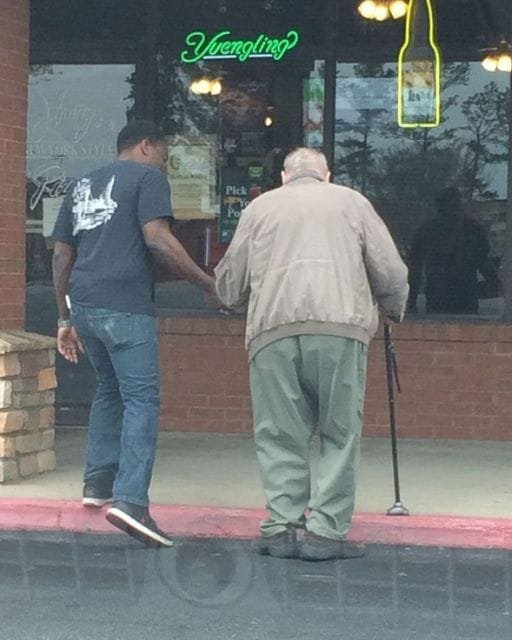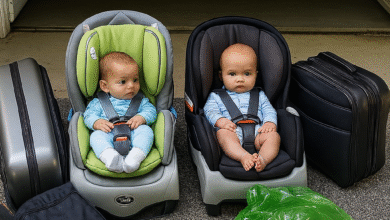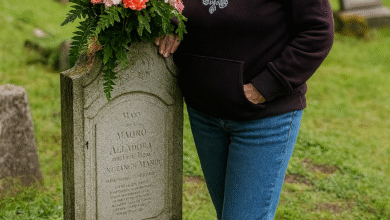I Stopped to Help an Old Man into a Restaurant—And He Changed the Way I See My Own Dad.

It was supposed to be just a quick pizza run. I had just finished a long, grueling shift at the shop, my hands were still greasy, and all I wanted was a large pepperoni pizza and the comfort of my couch. But as I pulled into the parking lot, I noticed an elderly man standing at the edge of the sidewalk. He was trying to step up onto the curb outside Salerno’s, using a metal cane that clinked with every step.
People rushed past him, going in and out with takeout bags, barely noticing him. I’m not sure why I stopped—maybe guilt, maybe instinct—but I rolled down my window and asked,
“Do you need a hand?”
He looked over, surprised, and nodded. He didn’t say much—just smiled.

I parked, jogged over, and offered my arm. He grabbed it with more strength than I expected. We walked slowly, and I noticed his shoes—big, orthopedic ones with Velcro straps—just like the kind my dad used to wear. Out of nowhere, I had a flash of my dad in our kitchen, struggling to open a jar, getting frustrated but pretending he wasn’t.
When we stepped inside, the hostess greeted him like an old friend.
“Hey, Mr. Benning. Usual table?”
He chuckled.
“Not alone today.”
Then he looked at me and asked,
“You hungry, son?”
I didn’t know what to say. I hadn’t planned on staying, but the way he said it—it felt like this wasn’t just about pizza.
We sat in a cozy booth near the corner. The smell of garlic bread and fresh basil filled the air, and for a moment, I forgot how tired I was. Without asking, Mr. Benning ordered two margherita pizzas. It felt oddly comforting, like he already knew I wouldn’t refuse.
After we settled in, he said,
“You’re probably wondering why I invited you.”
His voice was warm, but there was something heavier beneath it.
“Yeah, kinda,” I replied. “Thanks for the food, but…”
He held up his hand and cut me off.
“Let me tell you a story. Ever heard of ‘pay it forward’?”
I shrugged. Of course I had. Everyone has. But coming from him, sitting there in his worn cardigan, it hit different.
“My boy used to say that all the time,” he said. “Every time I thanked him for something, he’d grin and say, ‘Just pay it forward, Dad.’”
His eyes softened, as if he was seeing something I couldn’t.
“He grew up fast—too fast. Worked two jobs while studying, helped me out when times got hard.”
I nodded slowly. I didn’t know where the story was going, but I felt I should just listen. Something in his voice reminded me of my dad—quiet pride, quiet sorrow.
“One day,” he continued, “he stopped to help a stranger change a flat tire on the side of the road. Didn’t hesitate. That same week… he was hit by a drunk driver. Died instantly.”
The weight of his words filled the space between us. I didn’t know what to say. “I’m sorry”? “Thank you”? None of it felt right.
“He always believed in paying it forward,” Mr. Benning said after a long pause. “So that’s what I do now. To keep his spirit alive. Whenever someone helps me—even just holding a door or helping me up a step—I give something back.”
Suddenly I understood. The invitation. The pizza. It was all intentional. A lump formed in my throat.
After dinner, Mr. Benning insisted on walking me to my car. I offered him a ride home, but he declined.
“Nope. My ride’s coming. Besides, I live just down the block.”
When we reached my car, he pulled a small envelope from his coat pocket.
“Take this,” he said quietly, placing it in my hand.
“What is it?” I asked, confused.
“A gift card. For groceries. Gas. Whatever you need.”
He winked.
“Pay it forward.”
I tried to refuse, to tell him I couldn’t accept charity. But he stopped me again:
“Don’t argue. Just promise me you’ll do the same one day. Help someone else when life gives you the chance.”
I promised, though I wasn’t sure if I’d ever fully understand what he meant.
The next morning, I kept thinking about Mr. Benning—and my dad. They weren’t the same, but there were echoes. The same quiet dignity. The same stubborn independence. The same reluctance to ask for help, even when they needed it most.
After my mom passed away, Dad remarried and moved three states away. We talked every so often, but not like we used to. He was my hero when I was little—fixing bikes, building treehouses, always cracking jokes. Now, he felt distant. Like someone I used to know.
That afternoon, I called him. Not because I owed him anything, but because Mr. Benning had sparked something in me. Maybe gratitude. Maybe guilt.
Dad answered with his usual gruff voice.
“Everything okay, son?”
“Yeah…” I hesitated. “Just wanted to check in. See how you’re doing.”
There was a pause. Then he chuckled softly.
“Well, aren’t you full of surprises today.”
We talked for about an hour. He told me about work, his garden, the weather. Nothing groundbreaking. But it felt good. After we hung up, I realized I’d been holding on to a lot of unspoken resentment—about growing up, about things changing, about the silence between us.
But hearing his laugh reminded me how much I still loved him. How much I missed his voice.
A few weeks later, I found myself driving past Salerno’s again. Without thinking, I pulled into the lot and walked inside. The hostess recognized me immediately.
“Looking for Mr. Benning?” she asked with a smile.
“Is he here?” I asked, hopeful.
She shook her head.
“Haven’t seen him in a while. But he usually comes on Tuesdays.”
I thanked her and stepped outside, a little disappointed. Just then, I noticed an older woman struggling with her grocery bags. I ran over and offered to help—without thinking.
She looked relieved.
“Thank you, dear. These bags are heavier than they look!”
Her name was Margaret. As we walked to her car, she mentioned she ate at Salerno’s every Tuesday. That made sense—she was Mr. Benning’s ride.
“Do you know Mr. Benning?” I asked casually.
Her face lit up.
“Of course! Wonderful man. Always talks about how kind strangers can still be.”
Her words stayed with me. Unexpected kindness. That was what he believed in. What he lived by.
Months passed. Life moved on. But I kept paying it forward—helping a coworker with a flat tire, buying coffee for the person behind me, calling my dad more often. Each small act felt like a ripple, spreading far beyond what I could see.
Then one day, I received a letter. No return address. Handwritten. It was from Mr. Benning.
Dear friend,
I hope this finds you well. Life is full of twists, isn’t it? Some people pass through and leave a mark.
You reminded me of my son—not because you look like him, but because you share his heart.
Keep spreading light. The world needs more of it.
With gratitude,
Mr. Benning
I read it twice. Folded it carefully. Slipped it into my wallet. It felt like the end of one chapter—and the start of another.
Life’s biggest lessons often come when we’re not looking for them. Mine came from an old man with a cane and a heart full of love. Helping him that night showed me that kindness isn’t just about giving—it’s about connecting. About caring, even when it’s inconvenient.
If a stranger’s kindness ever touched your life, share it.
If there’s someone you’ve grown distant from, reach out.
Those small moments—those quiet acts of grace—remind us we’re all connected.
Pay it forward. People will thank you.





